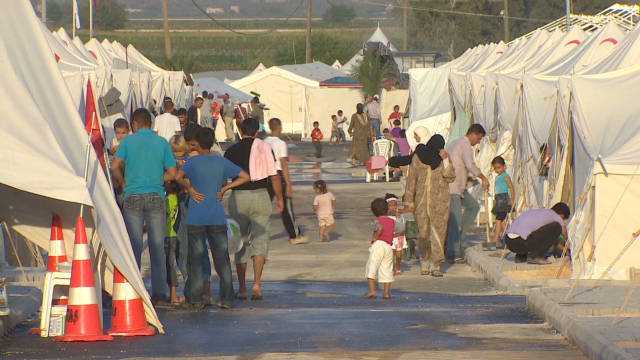Antakya, Turkey (CNN) — It didn’t take long for Ali Jadour to explain why he fled his homeland.

The 22-year-old man pointed to his empty shirt sleeve, where his right arm was amputated above the elbow. Then he lifted his shirt to show the dark scars left by bullets that had penetrated his stomach and back when Syrian security forces opened fire last May at an anti-government protest in Idlib province.
“They shot at us from helicopters,” Jadour said. “I was asking for freedom and democracy, nothing else.”
Jadour is one of thousands of Syrian refugees living in a network of Turkish government-run camps along the border between the two countries. Most of the refugees have been here for months.
The conditions at the Boynuyogun camp were relatively good, as far as refugee camps go. During a recent visit, the Turks were providing residents with free food, donated clothing and medical care. The government also offered Arabic-language school for the children, who played on jungle gyms and tried to help their parents sweep the freshly laid asphalt outside their tents.
But the presence of such tent cities, often located within sight of the Syrian border, is a powerful reminder that a significant segment of Syrian society still lives in dire fear of its own government. The Turkish government says more than 7,500 Syrian refugees reside in camps.
Harder to quantify is the growing number of unregistered Syrian refugees who have fled across porous borders to Turkey, Jordan and Lebanon after fleeing a crackdown that has claimed more than 2,900 lives, according to the United Nations.
They include men like Mohamed Abu Aled, who — dressed in a paint-spattered shirt and wearing flip-flops — labors illegally on a construction site in Turkey nearly six months after he, his wife and 2-year-old daughter fled Syria.
“This life has been forced upon us,” Abu Aled said as he cut strips of drywall. “It’s a refugee’s life.”
Abu Aled said he became a wanted man in his native coastal city of Lattakia after he participated in a series of anti-government demonstrations. Because he repeatedly said “no” to the Syrian government, he sacrificed his house, his shop and a stable income for his family in exchange for life on the margins in a foreign country where he does not speak the language.
Abu Aled’s eyes flashed when he was asked whether he had any regrets.
“I didn’t sacrifice anything for the revolution. I’m still alive,” he said. “I have no regrets. … We are simply demanding our rights. We have the right to live the way people in other countries live.”
According to the expatriate group Syrians in Istanbul, 4,000 to 5,000 Syrian refugees are hiding in Turkey. It’s unclear how many other Syrians have found themselves in similar straits after having fled to Jordan or Lebanon.
“When they come to Turkey, some of them have some money, and they have an idea … that shortly the situation will be changed in Syria and they will go back,” said Omar Shawaf, a member of Syrians in Istanbul as well as the opposition Syrian National Council, which was recently established in Istanbul.
“So they rent houses … but in a short time, they finish their money and come to be in a hard situation.”
Shawaf knows all too well the disorientation that results from fleeing one’s homeland. In 1982, at age 15, he fled the Syrian military assault on the Muslim Brotherhood city of Hama, which by Amnesty International’s estimates left as many as 25,000 people dead. Shawaf has lived in exile ever since.
The newest political refugees first take shelter in the Turkish border province of Hatay, near the churches and medieval cobblestoned streets of the ancient city of Antakya (Antioch).
They include Huda, the single mother of two teenage girls, who until recently had a comfortable job as a social worker in Damascus. Huda asked not to be identified in order to protect her relatives still living in Syria.
Upon arrival in Turkey several months ago, Huda said, she washed dishes, and her daughters worked with a local tailor to help make ends meet.
They now live in a grimy apartment; the girls have not been to school since they left Syria. “We are very lonely here,” Huda’s eldest daughter, Fifi, said in fluent English.
Like many of the other illegal refugees CNN interviewed, Huda said she spent most of her time indoors in order to avoid Turkish police. If caught, she could be deported for having overstayed her three-month visa.
The Turkish government has referred to the displaced Syrians as “guests” rather than refugees. As a result, the refugees are denied certain legal protections, including as free education and the right to find legal employment.
“We don’t want to play these cat-and-mouse games with the Turkish police,” Huda said. “We need documents to allow us to move legally. We need schools for our children. We need to be able to live here temporarily until the regime in Syria falls. Then we’ll go back to our country.”
That was the declared condition for return of all of the dozens of Syrian refugees CNN has interviewed in Turkey over the past six months.
And increasingly, they seemed to be pinning their hopes on the international community, praying that foreign pressure would bring the Damascus regime down.
“This regime will fall. There is no doubt about it. Because all the people are protesting and the cost in blood has been enormous,” said Abu Aled, the shop-owner-turned-construction worker. “Most governments around the world will not accept to deal with (the Syrian) regime because they are criminals and cold-blooded killers. So there is no way out. We will one day go back to Syria.”
via Syrians hiding in Turkey – CNN.com.




